To beat a virus that-s weaker outdoors, Mumbai must go al fresco. Architects, event management gurus and hospitality stalwarts make a case for open-air everything. We have the ideas; now let-s cut the red tape.
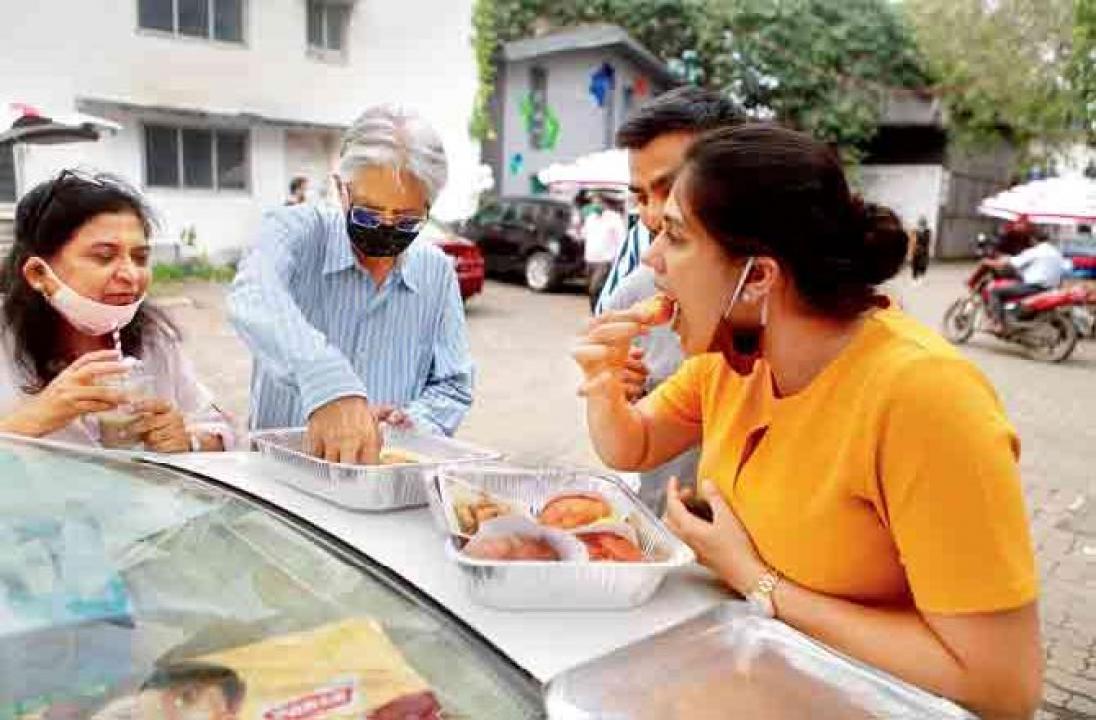
Mahalaxmi restaurant Masques first tailgate party in September saw diners park their cars in the Laxmi Mills compound where its located, to enjoy a meal in their seats or on their dickies. Almost 150 patrons turned up between noon and 9 pm. Theyve organis
On September 20, the usually quiet compound of Laxmi Mills in Mahalaxmi, came alive when diners, eager to socialise after a long lockdown, drove in to attend a tailgate party that chef Prateek Sadhu and Aditi Duggar were hosting. Their concept restaurant Masque had "moved" outdoors in the safety of a well-ventilated parking lot. Part picnic, part bash, tailgating is a social gathering in which food and drinks are served at or near the back end of a parked vehicle. The concept traces its roots to an intercollegiate football game between two American universities, Rutgers and Princeton, in the late 1860s. "We chose to organise it because the mill compound sees little or no movement on weekends," says Duggar, "This was our chance to make use of a practically palatial space that few have access to."
ADVERTISEMENT

Chef and co-founder of Masque Prateek Sadhu, interacts with a guest
Close to 150 diners turned up at the party that started at noon and wrapped up at 9 pm. Although Mumbaikars were late to wake up to the concept, they are evidently quick to catch up. What was meant to be a one-off celebration—it was Masque-s fourth anniversary—has become more frequent. Sadhu is already three tailgates down, with the fourth edition underway today.
As the economy begins to gradually open up and street life gathers steam, COVID-19 will only but change how we navigate and utilise our public spaces. Duggar says using the outdoor area in a creative way was long in the offing, but the pandemic provided the necessary push. The experience turned out to be convivial while still standing apart. It-s this argument that is driving cities around the world, from Sydney to Rome, to reshape neglected public spaces and degraded green patches into functional entities. Swathes of roadway in Europe are being transformed into cycling and walking spaces, and sidewalks widened to give people more ways to commute while also practising physical distancing. Recently, the New York City Council passed the permanent outdoor dining bill, allowing restaurants to set up curbside café seating right outside their establishments. Globally, the pandemic has sparked a growing push for sustainable cities with more scope for outdoor living. "Despite its notorious label of being overcrowded, the opportunities to harness public spaces are tremendous in Mumbai," says Rahul Kadri, partner and principal architect at IMK Architects, an urban planning and interior design firm, whose clients include the Taj Group, JSW Energy and Symbiosis Society. "We have 600 acres of land on the eastern waterfront, from Colaba to Wadala, which could be a gamechanger for the city, if optimally utilised. But the previous government gave away the planning rights of the eastern waterfront land to the Mumbai Port Trust. They are a company, so they will develop it the way they want to [commercially]. Now, with the Coastal Road underway, 70 hectares of extra land is being reclaimed. They are proposing to build a depot, which is silly, because there-s so much more you can do with it. What we are doing with the Coastal Road, is what Boston did with a freeway along its coast in the 1960s. They later buried the entire stretch and converted it into a public space and garden. The mistake they made four decades ago, we are making now." Kadri says it-s time for the government to ask the citizens what they want and act on feedback.
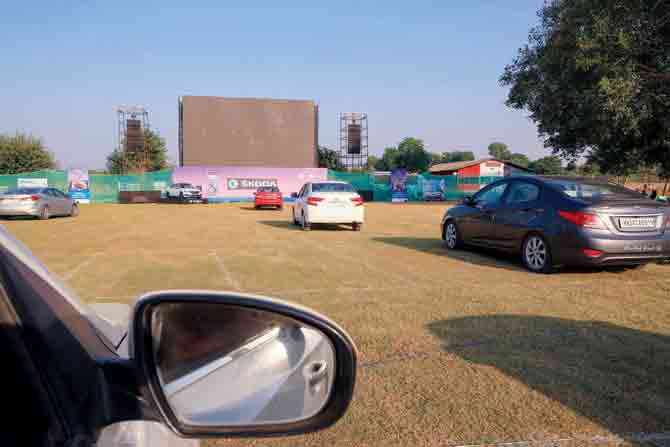
Ishaan Khatter and Ananya Panday-starrer Khaali Peeli was screened at a makeshift drive-in theatre at Backyard Sports Club, Sector 59 in Gurugram earlier this month. Swaroop Banerjee, COO and business head, Zee Live, says all safety protocols and social distancing measures were implemented. The drive-in also had contactless ticketing and F&B for viewers at a price of R999 onwards. PIC/NISHAD ALAM
When it comes to India-s urban pockets, there has been no -one-size-fits-all- formula to navigate spatial complexities. When the Unlock 4.0 guidelines came into effect on September 21, the government allowed open-air theatres to operate with a maximum of 100 people. Sensing the opportunity, a brand named Supermoon Drive-In partnered with Zee Live to introduce a first-of-its-kind drive-in theatre experience. Khaali Peeli, the Ishaan Khatter and Ananya Panday-starrer, premiered at drive-in theatres in Gurugram and Bengaluru. By then, the format had already proven to be a hit in countries across the world. In South Korea, figures reveal that the revenue from drive-in screenings has surpassed regular theatres, whose doors had been thrown open to public. Autokino Essen in Germany and Minnesota in the US, too, witnessed -sell out- screenings. "We were especially inspired by Colombo-s open-air drive-in musical concerts amid the lockdown, organised for the first time at the Ratmalana domestic airport," says Swaroop Banerjee, COO and Business Head, Zee Live.

Swaroop Banerjee
His team then applied for permissions across a few Indian states. "A lot of them weren-t ready.
Haryana, Delhi and NCR gave us the go-ahead. Before that, we did thorough research on whether people would come at all, although we had all precautions in place; body temperature checks at the entrance, masks and shields for staff and patrons and cars going through a fumigation tunnel. After six months of being indoors, people wanted to step out, provided safety was assured." Their apprehensions about the turnout were laid to rest when the tickets were sold out. The success has inspired Banerjee to propose the model to other cities, including Mumbai. According to him, although this city has fewer spaces than the capital, it has some spectacular ones, Jio Garden, the JVPD lawns and MMRDA grounds. "What it also has is robust safety infrastructure, which is crucial at this point. For instance, Mahalaxmi Racecourse has multiple entry and exit points, which makes conducting such events easier."
Like Banerjee, Kunal Avanti, co-founder and joint managing director of Magnanimous Group, a bespoke and luxury events company has already begun scouting for venues in the city. In 2018 and 2019, the brand conducted two editions of the Luxury Lifestyle Weekend at Jio Gardens, BKC, that saw specially-curated culinary offerings, sought-after international entertainment, masterclasses and art installations. The two events were, by far, the largest and most expensive that the venue had seen. "We have been thinking of how to conduct these again, because we have lost an entire year and might lose 3/4th of the next. It-s a two-million dollar event that needs to be executed well. The idea now is to find untouched gems in the city, because we don-t want to use luxury hotels; they lack novelty." He says the restrictions and regulations in public spaces make it a challenging proposition, which includes the cap on attendees not more than 75 people. They are eyeing beaches and gardens. "Our focus is also to find abandoned warehouses and mill complexes. We held a fashion event at Mukesh Mills a few years ago, which was a great success. But to get access to these places means you have to secure nearly 500 permissions from government agencies. This endless loop is so discouraging that a hotel lobby ultimately feels like a better option."
Sanjeev Bhargava is familiar with red tape. He founded Seher in 1994 with the vision of taking performing and visual arts into public spaces through live performances at monuments and public parks. Over the years, he has organised artists- camps on the banks of the Ramganga, in the foothills of the Himalayas, on the beaches of Mauritius, Kerala and Goa and even the premises of the legendary Khajuraho Temples. But in Mumbai, he hasn-t had much luck. "We were the company that started outdoor festivals in India because we felt that heritage monuments like Purana Quila and spaces like Lodhi Gardens in Delhi provided a great platform for dance and music. When we launched the Delhi Jazz Festival at Nehru Park in 2011, 5,000 people turned up. That-s when people realised that jazz is a form that can attract crowds. However, when I tried doing an event at the Gateway of India for the Government of France, traffic and security regulations proved a dampener," he says. Bhargava-s faith in open spaces stems from their democratic nature. "People find space wherever they can and sit down. It-s accessible. They also give artistes a chance to reinvent themselves. This presents a different challenge. I remember when Pakistani artiste and folk singer Iqbal Bahu came to Delhi to perform at Nehru Park, he was overwhelmed to see 7,000 people. He said, "Can I sing after 30 minutes?" Sumeet Nagdev, dance artiste and director of contemporary dance organisation Sumeet Nagdev Dance Arts, has performed at over 50 public spots in the city, ranging from the Flora Fountain and Matunga Railway Station to the Bandra and Sewri forts. In 2009, he developed a site-specific dance experience at the Carter Road promenade, where pedestrians could enjoy the performance while they continued walking. "We have beautiful gardens, parks and beaches that lend themselves to performance spaces. The initiative, however, needs to be citizen-driven. The best example is the Mahim beach. Along with Indranil Sengupta and Rabia Tewari, we started its cleanup in 2015. In three years- time, it became a citizen-s movement today. We now have 20,000 volunteers. My students even performed at the beach," he says. Nagdev says the huge garden near Hinduja Hospital that was used for skating two hours a day, could be a great resource. "Many of Mumbai-s public gardens have in-built amphitheatres. It-s about simplifying laws for artistes so that getting permissions is not an agonising wait."
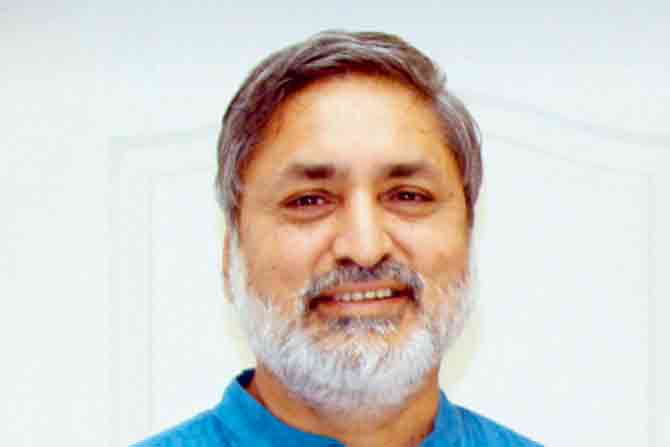
Mahesh Babu
Like Nagdev, Mahesh Babu backs Mumbai-s intent to be outdoors. The founder of Banyan Trees Event, he has conducted classical music performances across India for 25 years. Last year, in association with the BMC, he launched the Mumbai Green Raga Festival that featured 85 vocalists and instrumentalists, performing in 20 of Mumbai-s public gardens simultaneously. The idea was to provide a platform to up-and-coming musicians, and introduce the residents to green lungs in their own backyard. "But yes, it did take a lot of time, effort and energy. In fact for almost a month or two, the entire team was only working on securing permissions and arrangements.
Although we would love to go back to doing it, it is demanding and tedious."
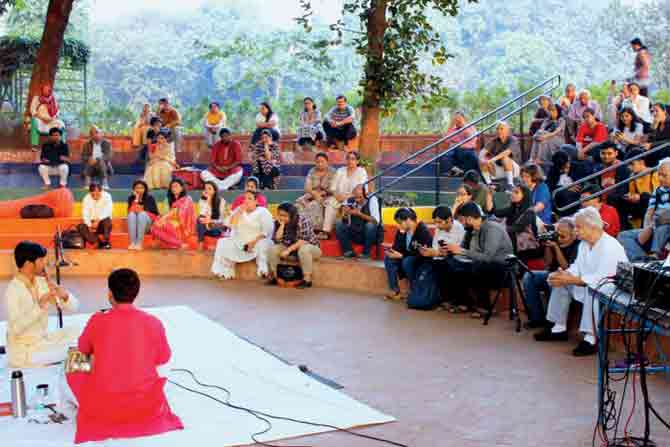
Last year, the Mumbai Green Raga Festival, organised by Banyan Tree Events in collaboration with the BMC, featured 120 vocalists and instrumentalists. The artistes performed in 20 municipal gardens across Mumbai simultaneously
Big Bang Music, a new age music label, dedicated to finding superstars in the non-film music space, has begun receiving enquiries for public performances, but an event is yet to materialise. "Live gigs are too tricky right now. Because we handle big artistes, it-s also a huge investment from sponsors. And they are not ready for it at this point," says singer-songwriter Raghav Meattle, who looks after marketing and partnerships at the firm. Balraj Ghai, owner of The Habitat, a performance space where poetry and open mics are hosted frequently, says comics are wary of how they will be received in a public space. "Stand up is niche and sometimes, the performers feel the material might not be as friendly for public consumption. Somebody in the audience might be easily offended by what you say, so they prefer a private space to perform, which is why Zoom shows are so popular." The other fear, he says, is about triggering a "super spreader event", a gathering that results in a much larger rate of transmission of the COVID-19 infection. Research, however, backs large open spaces with high ceilings or open to the sky, with ample natural air circulation as far safer.

Balraj Ghai
But, generating confidence in advertisers and promoters to invest is a humongous task, concurs Banerjee. "For this, your experience has to be top notch with the added cost of safety. Your revenues will be half, because that-s the number of attendees that are now allowed [due to physical distancing]." The way forward, he thinks, is to mix up virtual with physical live acts in order to be commercially viable.
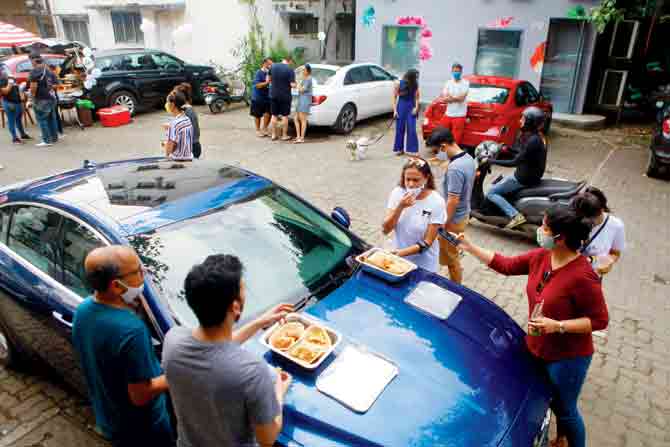
Diners group around their cars to enjoy a meal from Mahalaxmi concept eatery Masque in the parking lot. Tailgate parties are gaining favour around the world due to social distancing norms. PICS/ASHISH RAJE
Recently, the National Restaurant Association of India NRAI approached Maharashtra Chief Minister Uddhav Thackeray with the proposal to allow open air dining, given the risk to diners and staff in enclosed, air conditioned spaces. "We also mentioned how terraces and spaces abutting the restaurant which are open to sky, could be tapped into. We don-t want to cook there, only serve. The CM appeared amenable to the idea. In fact, he quite liked the concept," says Anurag Katriar, president.

Pulled pork truffle fries
Chirag Maru, property consultant for restaurateurs, says patrons are showing a greater interest in restaurants that have outdoor seating. "They feel more secure in a restaurant with an open area. At this point, occupancy on weekdays is very low. So, for a 4,000 sq ft restaurant to keep doors open and have only three tables occupied becomes economically unviable. The government must legalise the open areas."

Brisket burger
The 2017 Kamala Mills fire that led to the death of 14 people, sounded the death knell for terrace spaces to host diners. "If you keep proper SOPs in place and follow fire norms, we can avoid these tragedies. If we open up beaches to allowing shacks, it will bring a lot of revenue to the government. They must consider the option," adds Maru.

Masque fried chicken
Restaurants that have the luxury of outdoor spaces have, of course, begun optimising on it. At Riyaaz Amlani-backed French restaurant Souffle S-il Vous Plait in Churchgate, the overall terrace seating capacity has been brought down from 10 tables to four to ensure social distancing between tables. They-ve also added additional planters to give each table a tropical garden feel. At Thai restaurant Nara Thai in BKC, the al fresco section will open for dine-in within the permissible capacity. "We-re also looking at using our outdoor space to create grab-and-go nooks for mainly corporate guests.
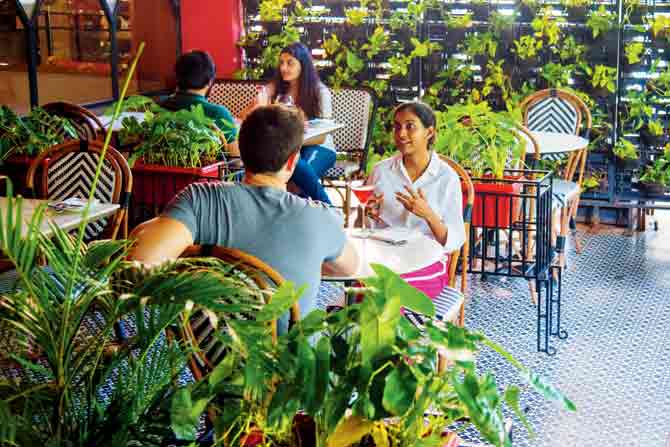
Souffle S-il Vous Plait-s outdoor area has been spruced up with plants, which also act as green barriers between tables
We have a tropical bar in the al fresco that we will use to dispense pre-ordered food and signature Thai iced teas. Come December, if the rules allow us to be open until later in the night with an increased capacity, we wish to bring back our live music property, Sounds of Sunset," says Karyna Bajaj, executive director, KA Hospitality.
Cities such as Pune and Bengaluru are seeing a greater number of live acts and performances. Karan Khilnani, co-founder of Elephant & Co Gastropub, Pune, says the city-s weather, unlike in Mumbai, lends itself to evenings in the outdoors. "We-re screening the IPL matches in the al fresco section, but we also did a boiler room set by DJ Solomun on our first Friday night and that got us quite close to the vibe of a live set. During the day, the space doubles up as a co-working space. We wanted to provide some respite to everyone who has been working from home. We provide guests with free WiFi and coffee on the house."
RA Rajeev, Metropolitan Commissioner, MMRDA, says although they, as a civic agency, are not planning to organise outdoor activity at the moment, they are encouraging people to come out in the open and use the space for walking, jogging and cycling. "These are individual activities and don-t carry the risk of spreading infection. We also floated the idea of car-free days at BKC on Sundays, but we didn-t receive an encouraging response from the people," he says. Speaking about public gardens, he says they will be opened up soon and
through the day.
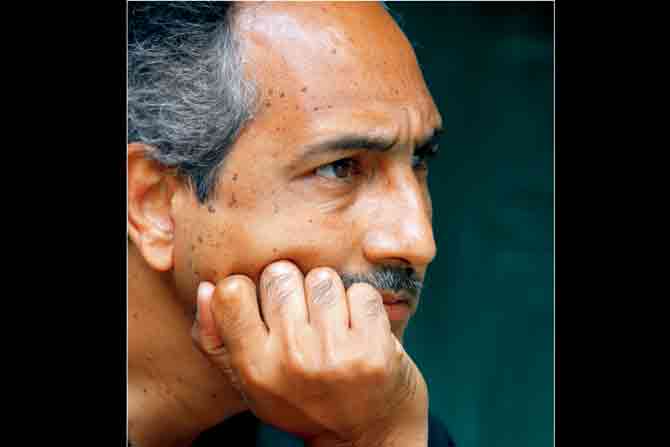
Rahul Kadri
Across the country, efforts are being made to decongest urban spaces. According to reports, the Chandni Chowk Redevelopment Plan in Delhi will decongest the 1.3-km stretch between Red Fort and Fatehpuri Masjid to facilitate free pedestrian movement. Incidentally, it is the first major commercial development in the city-s shopping hub after 300 years. Kadri says what we need to think about is, how do we reclaim more land into the public sphere? He suggests moving all long distance travel underground and providing the over-ground space to pedestrians. "You can make your footpaths 30 feet wide, plant more trees and make the city more livable. It-s possible."
There is no dearth of inspiration to build sustainable and resilient cities. He gives the example of Bilbao, a once-inconspicuous industrial port city in northern Spain. "When the ship building industry took off in Japan and South Korea and started making ships at half the prices, Bilbao couldn-t compete. The city decided to capitalise on arts and culture, because that-s what people travel for.
They made a series of cultural buildings along the coast and the first one they built was the The Guggenheim Bilbao, a museum of modern and contemporary art designed by Canadian-American architect Frank Gehry. The money they spent in doing this, they recouped in the first two years. From nobody knowing about this place, they now have two million tourists coming in."
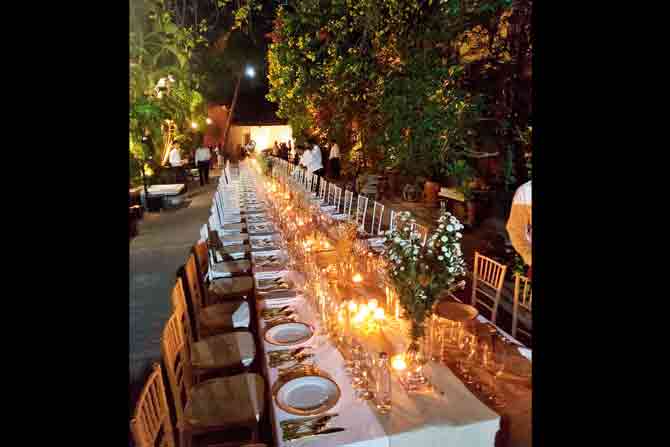
The setting for a corporate dinner right held in the outdoor section at the New Great Eastern Mills before the pandemic. Experts say Mumbai is space-strapped but it has abandoned mills which are perfect to host outdoor activities. Dr Anurag Kanoria, director, The Great Eastern Home, situated in the 176-year-old The New Great Eastern Mills in Byculla, says, "Our space is located in the heart of Mumbai-s textile district, and spread over a large area comprising two luxury furniture and lifestyle shops, an art gallery and other spaces among tree-lined driveways and vast warehouses. Our flagship store The Great Eastern Home itself is spread over 60,000 sq ft. With so much space, it is easier for social distancing. We have already begun renting out our spaces again. In the past, we have hosted weddings, music festivals and exhibitions and hope to continue to."
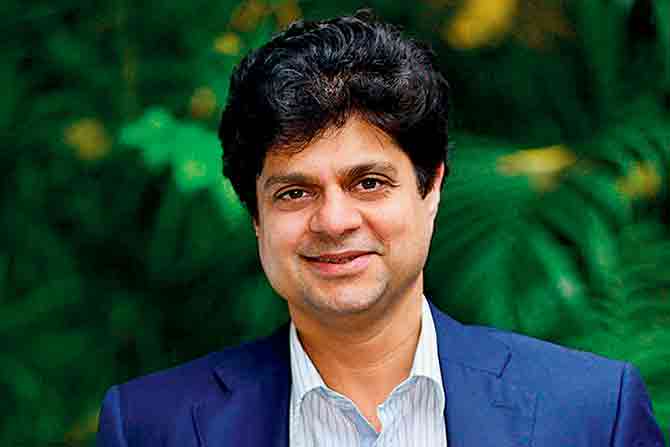
Dr Anurag Kanoria
Keep scrolling to read more news
Catch up on all the latest Mumbai news, crime news, current affairs, and a complete guide from food to things to do and events across Mumbai. Also download the new mid-day Android and iOS apps to get latest updates.
Mid-Day is now on Telegram. Click here to join our channel @middayinfomedialtd and stay updated with the latest news
 Subscribe today by clicking the link and stay updated with the latest news!" Click here!
Subscribe today by clicking the link and stay updated with the latest news!" Click here!







